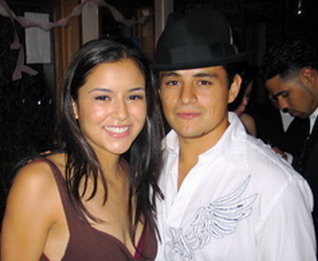
I showed up at the Ritz Carlton for my interviews with the team from Quinceañera wearing my new Steve Barretto "Brown Jesus" t-shirt that I picked up at the deYoung's Chicano Visions exhibit. Jesse Garcia found the t-shirt "awesome" and Emily Rios found it "cool" and they were both disappointed that they wouldn't get to be in San Francisco long enough to check out the exhibit themselves. They were scheduled to fly out mid-afternoon to Denver after a full day of interviews and photo shoots. I was glad I'd brought the exhibition catalog with me so I could at least show them Carmen Lomas Garza's painting Quinceañera, which I felt they should see and which they much enjoyed. All the Quinceañeras were in town!
Michael Guillén: Emily, Jesse, I appreciate the two of you taking the time to talk with me because I'm so proud of both of you. I love this film. What a film with heart! I'm Chicano myself and I'm so pleased to see this representation. You're both—well, not so much unknowns anymore—but you came out of nowhere and this little sleeper hit took Sundance by storm and has been impressing people all over the place. Could you tell me a little bit about your backgrounds and we'll go from there?
Emily Rios: Both of my parents are from Jalisco. I'm joking. Background? As far as acting-wise, you mean?
MG: Acting-wise, yes. Is your family actually from Jalisco?
Emily: Yeah. As far as my acting, on top of my resume was Cleopatra in the high school play. So I don't have a lot of experience. I did commercials here and there. I did one short film. I did some extra work on a music video. That's pretty much all my resume consists of. I didn't have too much experience.
MG: How did they find you?
Emily: I had an agent and a manager at the time. My agent called me and said, "Hey, y'know they're auditioning people for this independent film called Quinceañera" and I was like, "Okay, cool." I auditioned and I got extremely fortunate.
MG: They were fortunate.
Emily: Thanks.

Jesse Garcia: We were all fortunate. I did a casting workshop in Atlanta probably four years ago with this casting director that was casting the movie, Jason Wood, and I was on the Nosotros email list—it's a Latino networking organization in L.A.—and I saw this casting for Quinceañera and I read the breakdown of it and Carlos and was like, "Ah, this role seems really cool." I emailed Jason and I said, "Hey man, I'd love to read for this if you guys are still looking for the part." They brought me in and I did all right.
MG: Now that you have done this film and you have done so well in it and it's been doing so well, has it changed your lives? Have you been on a whirlwind publicity tour?
Jesse: Publicity's been pretty crazy. Yeah, this junket thing is new for both of us. I've been acting for about six years now and I've done some other short films and other independent films that have done okay. I was in HBO's Walkout that came out earlier this year about the 1968 high school walkouts; Edward James Olmos directed it. I've done some other things so I was kind of proud that—outside of Chalo González—I was one of the more experienced actors in the leads. But this is completely new and it has kind of changed our lives to where we're flying around the world and dealing with press.
MG: Is it fun?
Jesse: Yes! We're having a good time. It's exhausting. [Exaggerating] It's exhausting!!
MG: I bet. They should put you up in a nicer place, don't you think?
Jesse: [Laughs.] I know, right?
Emily: Yeah, like, what is this?
Jesse: Yeah, c'mon.
MG: Jesse, is your family also from Mexico?
Jesse: My dad's from Durango, Mexico. The state of Durango. My mom is from Wyoming. Her and I were born in the same town in Wyoming—Rawlins, Wyoming.
MG: I know Rawlins. I used to work there.
Jesse: No kidding?!
MG: My step-father was a sheep shearing contractor so we would go up into the hills a lot and station ourselves in little towns in Wyoming and Montana.
Jesse: Wow. I've never even met anyone else that's even heard of it or lived there.
MG: I know it. It's a good thing you got away.
Jesse: [Laughs.] Right. Everyone would say that. My family's still there. Everyone's still there. My mom's Spanish and Mexican and other. We still don't really quite know what all of our genealogy is—I think that's the word, isn't it?
MG: Yes, it is. What was so beautiful to me about Quinceañera—because I've studied Chicano art and film for a long time—what was challenging about the film and why I think it's an important film, is it explores many marginalized areas. Just like what you're saying about your genealogical background, there are no real clear definitions here. And one of those vague areas that was most intriguing to me is that—though it has a Catholic overlay—the film actually has an evangelical base. My understanding is you were both brought up evangelical?
Jesse: No, we were both brought up Jehovah's Witnesses.
MG: Was the Catholic inflection anything you were familiar with?
Jesse: Vaguely. I mean, they're all Christian religions so I was vaguely familiar with it. I never really studied too much of anything. I grew up Jehovah's Witness. I stopped practicing a while ago. I wanted to pick different things from different religions that I thought applied to my life and apply them. But I think it was a more Evangelical theme in the movie where nothing was clearly defined.

MG: The reason I ask—and I'm going to talk to the directors about this as well—is that I've studied for many years the "story" of the Virgin of Guadelupe. I was impressed with your assignment, Emily, that you had to depict this young girl who was a virgin, but pregnant. What a complicated idea to get across! I loved in the film when the dad was saying there was no such thing as a pregnant virgin and the Tio clasps his medallion of the Virgin of Guadelupe. Because the Virgin of Guadelupe, as you know, was en cinta and—after years of studying her—I'm aware most people don't know that the floral designs on her robe are ancient Nahuatl symbols that link her back to the Nahuatl goddesses Coatlicue and Tonantzin. It's a progression of goddesses. So I'm very proud of you, Emily, because you are in a line of representation of that story. You are the most modern inflection of that story. Did you study that legend much? Did it work into your interpretation of the role?
Emily: Not at all. I had no idea. I'm somewhat familiar with the Catholic religion just because of my extended family, a lot of them are Christian, a lot of them are Catholic, I don't even know. I have no idea of the background to Guadelupe or the Virgin Mary. I don't even know if they're the same person. I have no idea about that religion. I was born into a family of Jehovah's Witnesses and that's the only thing I've ever been exposed to in my entire life. The only thing I've ever taken from other religions is what I've heard and what I've seen. It's nothing that I've researched or known about. I learn as I go along. Like you're just giving me a whole insight about the background of Guadelupe and her robe. I had no idea there was any significance to it whatsoever.
MG: Yes. It's actually quite profound. The name of the flower on her robe is nagvioli and it comes from the Nahuatl tradition in the Valley of Mexico. It's a specific reference to fertility and their solar deity Huitzilopochtli. Coatlicue was a pregnant virgin goddess who gave birth to Huitzilopochtli. Over the years and through various cultural contacts it transformed into the legend of the Virgin of Guadelupe. I'm proud that your performance in Quinceañera has continued the legend and that I have one more citation for my thesis. [Laughs.] I'm really pleased about that. As Jehovah Witnesses, then, did your families have any objections to the roles you were playing? Because both of your roles were edgy.
Jesse: Right. Well, I don't practice anymore. My parents, they still practice occasionally, but, they're very supportive of whatever I want to do. They actually came and saw the film at Sundance since they live so close. Everyone came down and saw it at the last Friday night screening and really loved it. They enjoy what I do. As long as I'm happy doing what I want to do, they're cool.
MG: I have to ask you a very pointed question: do you actually have a tattoo that says travieso [troublemaker] on your abdomen? My readers will want to know.
Jesse: [Chuckles.] No. It's tattooed on my soul.
MG: I thought that was hilarious and sexy. So, Emily, are you actually from Echo Park, the neighborhood in the movie?
Emily: I grew up in a city similar to Echo Park in El Monte, it's in the San Diego Valley, but, not Echo Park.
MG: Because the gentrification issues were interesting and are ongoing concerns as these cultures collide, as gays move into Latino neighborhoods. I was likewise impressed with your complex representation of a young gay cholo, Jesse. This film has had a mixed reception, partly based on those issues. Some people like it a lot, like me. If I would have been at Sundance I would have been jumping up and down. And other people don't like it. And that range of reaction is curious to me. Is it a cultural bias, do you think?
Jesse: I hear that too. It's kind of surprising and it's kind of not at the same time. The teen pregnancy and the gay issues can be very hush hush in Latino culture because it's not something you really want out there, y'know? But I think that once more people start to see this movie for what it is and the positive social issues that it brings up and how to deal with things, that people may eventually open up, especially those skeptics who are not supporting the movie because of the gay issue and the teen pregnancy, especially Latino culture. From what I hear they don't want to bring these issues out into the wide open because they think it's shaming the Latino culture, which is naïve because it's actually probably going to help kids and people who have these issues going on to deal with certain things, you know what I'm saying?
MG: Exactly. I'm always concerned for queer youth because it's a difficult time fraught with hazard. Both of your characters' stories, they're heart stories, to be ostracized from family and to be marginalized and to have to survive. I had to. I left home at 15. You have to survive and often there's not anything or anyone out there to help you. In the story of Quinceañera you had this wonderful tio played by Chalo González. What was it like working with him?
Jesse: That man's magical, man.
MG: Yes, it comes right across.

Jesse: He's so amazing. I met him by chance at one of the Nosotros networking meetings and he goes [imitating Chalo], "I just got this lead role in Quinceañera." "Dude! I'm in Quinceañera too, man! Wassup?!" Then we started talking. When you watch the film, the way he's in the film that's the way he is in real life. He's a charming charming man and his stories are amazing. Nobody can tell a story like he does. His life story is unbelievable.
MG: I understand he got his start in films breaking up a fight?
Jesse: Breaking up a fight with Sam Peckinpah in a bar in Tijuana. Some friends of Sam Peckinpah's in L.A. told him to say the wrong things to the Mexicans across the border to buy him a drink.
Emily: He ended up insulting them.
Jesse: Then Chalo went in and separated them and figured it out and everyone started laughing and he goes, "Hey, man, my name's Sam Peckinpah. Thanks a lot."
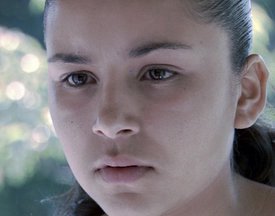
MG: You've commented on how natural an actor Chalo is, but, you're all natural actors. Emily, your performance is so understated. It was a pleasure to watch your face.
Emily: Thank you.
MG: Sometimes you'll see actors and they're using tricks. They are so obviously acting. With you it seemed like these things were really happening to you. Can you talk a bit about how you developed the role?
Emily: It's so funny when people ask me that because I really wish I could give you an answer and I wish I knew the answer to it. I really don't know anything I did different than I wouldn't do in my regular life. When you're in school and you're doing the school play, you'll be messing around backstage with your friends but when you get on you know your role, you know your lines, you know what you're supposed to do, so you just go out and perform it. I thought it was just as simple as that. When you get out in front of a camera, you just basically know what you're supposed to do. I always say I've never had any acting experience but then I started thinking about it now and I'm just like, okay, well, I was in these school plays, and me and my friends would be messing around since we knew each other for so long and we had such a long rehearsal process and this is live so we have to get it down in one take. I mean, there is no messing up. You have to take it all down at once. So it's like, okay, once you build up your acting experience in theater and stuff, it's like you know you got it's a one-time and one time only. Maybe that's how easy it was for me. I just went on and took the best direction I could from the directors and performed to the best of my ability. But there was no research done. There was no preparation I needed to do for the role. I just feel I related to the character on a lot of different levels so I don't feel like I had to act too much. It wasn't a natural-acting thing, it was just a natural ability that I was able to connect with the character and feel her and her emotions and what she was going through. I just tried to come out and perform it to the best of my ability.
MG: Well, it was a job well-done. Is it leading to anything new? Are you working on anything new?
Emily: Yeah. Especially my next big thing in late August with Paul Rodriguez, Jr. He'll be shooting his first film and we'll be working together in Venice Beach.
MG: Can you tell me a little bit about it?
Emily: It's called Vicious Circle. I can give you a little background on my character: I play this lead singer in a rock band who is a hardcore drug user and epileptic and it's a very intense character.
MG: You're good kids being asked to play these bad kids!! What's up with that?
Jesse: I'm a baaaad boy! [Laughs.]
MG: How about yourself, Jesse? What have you got coming up next?
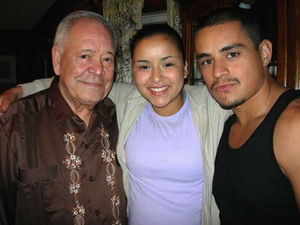
Jesse: I just shot a guest star on The Closer. That will be coming out August 25, episode 11. I did a movie in Mexico, a small part in Mexico called Boy Immigrant. Patricia Riggen, she's the director. America Ferrera and I play a brother and sister and we cross the border and try to smuggle this boy across so I can make some extra cash for my college. It's a small part. It's about this 8-year-old boy who's trying to find his way across the border to L.A. from Mexico after his grandmother dies to find his mom who's been in L.A. for about four years. It's a story about immigration and the family and the struggle. Then I've been cast in a few more movies that we're waiting to get off the ground. Just kind of finalizing things before we shoot. One movie, Looters, kind of an action dark comedy that Maya Pictures is doing, the same production company that did Walkout. A few other ones. I've got my hands in different pots stirring around. Trying to make me some tasty soup.
MG: Well, good!! I'll probably be following your careers from hereon in. When I was reading the critical response for Quinceañera, something got my goat: this idea of reverse discrimination in cinematic representation. Some of the reviews I read said, "They're so unfair to white people. They're so unfair to gay people. They've glorified the Latino image and made sketches of the others." I was recently talking to Larry Clark about Wassup Rockers where the same criticism was levied. Do you have any reactions to that criticism, other than it's just plain stupid?
Jesse: [Laughs.] It is just plain stupid. And I don't think anything was glorified in it. I think everything that was in there was very real. The two gay men, the gay couple that are in the movie, those guys, they're kind of depicted as pseudo-villainous and kind of preying upon this younger guy….
MG: But he seduced them.
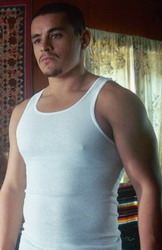
Jesse: Yeah! Yeah. We all seduced each other. It's not like Carlos didn't want to be there. Those guys are real. Those guys exist. It's characters like that that people don't want to see because they don't want other people to know that there are actually predatory guys out there like that, y'know what I'm saying? And then the Latino culture worry that there's a gay cholo or a teenage pregnancy, they don't want to see that either because that's too real. This movie is honest and real and it tells things how it really is and people kind of get scared of that.
MG: I also thought it was an unfair assessment because the Latino characters aren't by any means saintly—other than the Tio who is like a wonderful saint and the heart of this movie—but the character of the father is obviously a conflicted man. I loved the final reconciliation scene where he kept trying to make it a religious event. [Laughs.] That's a wonderfully-played scene. This is where I commend you as an actress, Emily, because it isn't like you had to drum these things over our head. You just said them like a kid would say them. "Dad, it wasn't that." I really liked that.
Emily: Thanks.
MG: So what are your hopes for this movie?
Emily: I hope for it to get the reaction it deserves, like it's been getting. I hope once it finally opens in the theaters and for the public audience to be able to go see it and to see it for the film that it is regardless of who's in it or who isn't. At Sundance in the beginning nobody knew about our film and nobody wanted to go see it, but once the buzz started going around, everybody wanted to come and see it. Which is fine. Everybody wants to go see the Jennifer Aniston movies, and Justin Timberlake, and whatever was at Sundance, which is understandable because, y'know, they've got these named actors in there. I just want them to see the film for what it is: a realistic film that's something that we're living in our everyday life and I want to expose the world to a different culture and another side of the world that I don't think they're exposed to and have no idea what's going on. I want to expose them to a whole 'nother world that's just right around the corner from where they live.
MG: And yourself, Jesse?
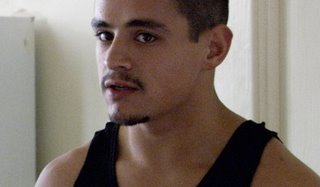
Jesse: I want people to come and watch it. I want them to have their own opinion whether they like it or whether they don't. I would like them to come away with a sense of satisfaction, having seen a movie where I could compare it to eating a wonderful meal, a meal where you eat in a restaurant in an environment so nice and everyone with you is unbelievable and you want to go back to that restaurant and you want to eat something else and want to try something different. Having left this movie you want to see what happens afterwards and you want to see what happened before and you want something to talk about afterward, whether you liked things about it or you didn't. But you still have a sense of satisfaction when you left. The people that are very skeptical about the movie, whether they admit it or not, they still have a sense of satisfaction because that's what got their minds stirring, you know what I'm saying? I want people to enjoy it and make their own opinion and have something to talk about.
MG: You two are being paired together a lot for publicity purposes. There's a lot of photography work being done with you two. Are you two friends or is this all just professional?
Jesse: It's mostly professional. We don't really get along.
Emily: This is the acting coming into play.
Jesse: I've been using the word magical a lot lately but we got along together right away. It's cool. It's not like either one of us look at each other as older or younger. We kind of just saw each other as equals right away and just had fun.
MG: The tension that you develop in the film is lovely. It's sensual and it's lovely to watch. The peanut butter line. Where'd that peanut butter line come from? Was that in the script?
Emily: Yeah, that was in the script.
MG: That blew me away. I thought, how could they say that? [Laughs.] Regarding publicity, what do you think of all the hype and press? Is it hard to handle? Is it hard to keep centered?
Emily: It's hard to keep awake.

Jesse: Actually, it's fun. It's fun and as an actor—I think I can speak for Emily as well—we go into a movie especially as new actors wanting to act and not knowing what to expect afterwards. After something like Quinceañera where it's very successful, now we have a social responsibility to meet the press and talk about the movie and have an opinion about the movie and life and the issues that sort of relate to it and things of that nature. It's fun. It's educational. And it was very unexpected too. You see it on t.v., but you don't really think it's going to happen to you. It's interesting. I'm having a great time.
MG: At Sundance, when the buzz started and you saw that the film was becoming popular, would you guys go to your hotel room and rev up? What was that like?
Emily: I had left pretty early on in the festival. I was there for a couple of days. I was just really happy with the reaction but I mean I was so naïve to everything. I didn't know about Sundance so I thought everybody got the same type of buzz that we were getting. If not, a lot of people got a lot bigger buzz. But it was really cool to see people who'd be walking down the street and we'd overhear them. They wouldn't even know we're standing right there next to them. They'd be like, "Oh, what'd you think of Quinceañera?" "Oh my god, it was so great." "It was good, right?" "Yeah, it was so good." It was a lot of fun. It was cool. To overhear people's reactions and the way they got the film, and what they took out of it and whatnot. I don't know what I would take from [the Sundance experience]. I wasn't jumping up and down and going crazy. I guess I really didn't know what a big deal it was.
MG: That naivete probably protects you in a certain way. I know in my youth it was a protection. Well thank you both so much. Quinceañera is a wonderful project, you both did a great job, and I look forward to monitoring your careers over the years. I hope to get to interview you for your next!
Cross-posted on Twitch.